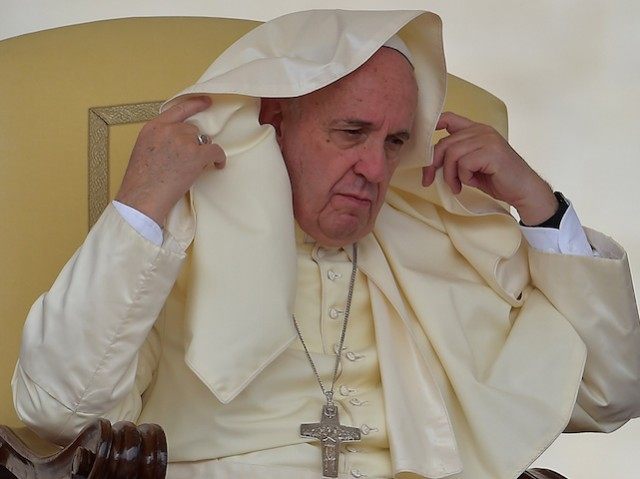Vatican City (AFP) – He is the self-declared foe of unbridled capitalism, rabid consumerism and have-it-all lifestyles — but are conservatives right in fearing Pope Francis is anti-American at heart?
The pontiff’s attacks on those who worship the “God of money”, appeals for an ecological revolution and criticisms of an unjust global economic system that excludes the poor have all wound up economic ultra-liberals.
From Wall Street to the Tea Party, critics have slammed Argentine Francis as a poorly camouflaged Marxist and the debate is intensifying ahead of his arrival in the United States next week.
The 78-year-old head of the Roman Catholic Church certainly believes the superpower should do more, and fast, to live up to its responsibilities, and is unlikely to skip the chance to urge Americans to change their decadent ways.
Vatican expert Andrea Tornielli told AFP he didn’t believe Francis was anti-American.
“What he has said about a savage financial system, an economy that kills, an idolatry of money, is part of the Church’s social doctrine,” Tornielli said.
It is, however, “a doctrine in many aspects forgotten by those who, even in Catholic circles, glorify the current system as the best of all possible worlds, and who continue to say that the markets should be even freer because it’s the only solution to end poverty and hunger”.
Asked in July how it felt to have been termed by one American television presenter “the most dangerous man on the planet”, Francis said he would study the criticisms made against him, after which “dialogue must ensue” — suggesting he may be gearing up to challenge his detractors on their home turf.
He will also have his work cut out in wooing disaffected US bishops, many of whom complain he has not given them enough support against the Obama administration over abortion, contraception and gay marriage.
– ‘Awe and resentment’ –
His superstar status has led to a boom in papal tourist souvenirs on sale ahead of the trip, but there are grumbles too: critics complain the country has been left off the pope’s radar too long.
Francis hardly mentions the United States in his writings, and chose to visit ‘far-flung’ places such as Albania, Bolivia and Sri Lanka before Washington.
Austen Ivereigh, author of a biography on the pope, says “for him, the United States is not the centre of the world”.
Experts say the pontiff will undoubtedly praise the Stars and Stripes for its history as a land of freedom — but will not hesitate to confront the current ultra-conservative, xenophobic and often religious right wing.
“The Pope vs. The Donald: The anti-Donald Trump is coming to town. And he speaks Spanish too,” said an editorial in the American news outlet Politico, in an allusion to the Republican presidential candidate’s attacks on Hispanics.
Religious expert John Allen, who writes for the Crux website, said of Francis that “there are unmistakable signals that he sees the United States as part of the problem as much as the solution.
“He feels some of the same ambivalence about the United States many Latin American bishops do,” Allen told AFP.
“It’s a mix of awe about the economic and military power of the country, and respect for the generosity of Americans in times of need, combined with resentment over the checkered history of the US in Latin America and doubts about the fundamental justice of the global economic system the US represents,” he said.
Francis is expected to garner massive media coverage, whether positive or negative: he will be the first pope to address Congress, a decision the Vatican said was based on the opportunity to speak out to “all Americans”.
And, typically, he’ll spend a significant amount of time with those forgotten, overlooked or neglected by society, from the homeless, to prisoners and immigrants, as well as America’s young.
Marco Politi, papal biographer, said Francis’s main aim is for “America to reflect on the growing gulf between billions of poor people and a small group of super-rich”.
Fellow Vatican expert Iacopo Scaramuzzi believes Francis will be firm but not combative, insisting on man’s culpability for global warming, but keeping “an open attitude to North American culture” as the US’s guest and possible friend.

COMMENTS
Please let us know if you're having issues with commenting.